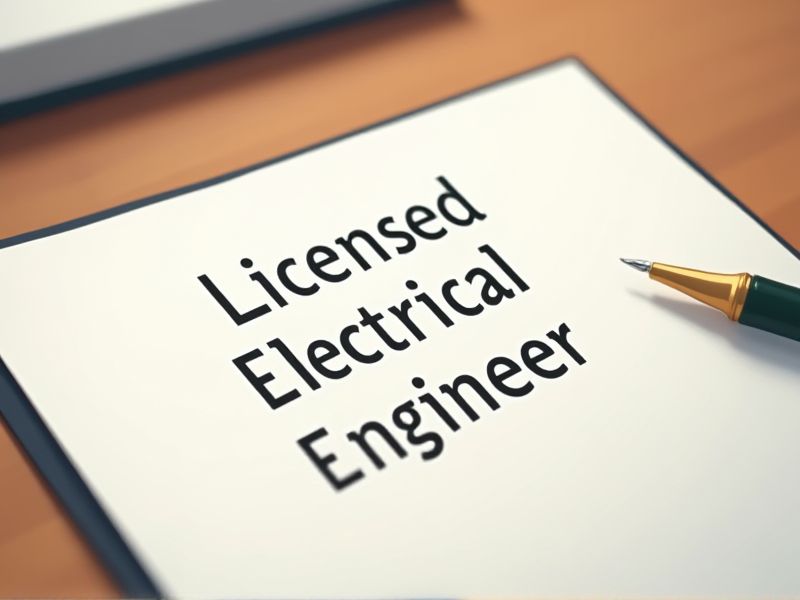
Licensed Electrical Engineers require specific certifications to ensure they meet safety standards and industry regulations. These certifications validate their expertise in handling complex electrical systems and troubleshooting critical issues. Without such credentials, engineers might face limitations in career advancement and project eligibility. Consider these important certifications for a Licensed Electrical Engineer.
Fundamentals of Engineering (FE) Certification
Obtaining the Fundamentals of Engineering (FE) certification is required as it serves as a crucial initial step in becoming a licensed Professional Engineer (PE), a credential that signifies a higher standard of professional competency and opens up advanced career opportunities. The FE certification validates a comprehensive understanding of engineering principles, which is essential for ensuring safety and efficacy in electrical engineering projects. It acts as a benchmark for employers, facilitating job placement by distinguishing the certified individual in a competitive job market. The certification also qualifies engineers to legally offer their services to the public, as many states and employers mandate this credential for authorizing engineering projects.
Professional Engineer (PE) License
Holding a Professional Engineer (PE) license enhances credibility and enables an electrical engineer to sign off on engineering plans and documents, which is often a legal requirement for public works projects. Having a PE license increases career prospects as many employers prefer or require it for senior engineering roles. A PE license demonstrates commitment to ethical standards and ongoing professional development, boosting trust with clients and colleagues. Liability insurance often necessitates certification by a licensed professional, making it essential for engineers working in high-stakes environments.
OSHA 10-Hour Electrical Safety Certification
The OSHA 10-Hour Electrical Safety Certification enhances an electrical engineer's understanding of safety protocols and compliance standards, reducing the risk of workplace accidents. Completing this certification can lead to reduced liability and insurance costs for employers, as it demonstrates a commitment to maintaining a safe working environment. Awareness of hazard recognition and prevention covered in the course ensures that engineers implement safer design and maintenance practices. Employers often require this certification to meet industry safety benchmarks and to assure clients of project safety compliance.
National Electrical Code (NEC) Compliance Certification
Compliance with the National Electrical Code (NEC) ensures safety by standardizing electrical installations and reducing the risk of electrical fires and hazards. Achieving NEC certification validates a licensed electrical engineer's up-to-date knowledge and expertise, which is crucial for safeguarding public welfare. NEC certification is often required by local authorities and jurisdictions to secure permits, facilitating legal and regulatory alignment for engineering projects. This certification also enhances professional credibility and competitiveness in the job market, fostering career growth opportunities.
Certified Energy Manager (CEM)
Certified Energy Manager (CEM) designation enhances a licensed electrical engineer's expertise in energy efficiency and sustainable design, leading to more cost-effective projects. With comprehensive knowledge of energy management, engineers can improve building performance and meet stringent regulatory standards. Employers and clients often prioritize CEM-certified professionals for their proven ability to reduce costs and optimize energy consumption. The credential also signals commitment to staying current with industry trends, boosting professional credibility and career opportunities.
LEED Accredited Professional (LEED AP)
An electrical engineer with LEED AP credentials gains a deeper understanding of sustainable energy practices, positively impacting green building projects. This certification enhances their ability to design systems that meet both energy efficiency standards and regulatory requirements, reducing environmental footprints. Gaining LEED AP status can improve a firm's marketability in the growing green construction sector, driving business opportunities. Equipped with this knowledge, the engineer can collaborate more effectively with other professionals to implement integrated, eco-friendly solutions.
NICET Certification in Electrical Systems
The NICET Certification in Electrical Systems serves as a standardized assessment of technical knowledge, ensuring licensed electrical engineers have proven expertise in specific areas like alarm systems or fiber optics. Meeting this certification requirement often leads to enhanced job opportunities and higher salary potentials, reflecting the specialized skills gained. Many employers recognize NICET Certification as a demonstration of industry competence, which can be crucial for career advancement. Gaining this credential may also instill greater trust from clients and stakeholders, as it signifies a commitment to professional development and adherence to industry standards.
Project Management Professional (PMP)
The PMP certification enhances a licensed electrical engineer's ability to manage complex projects efficiently by providing structured methodologies. It significantly improves communication and coordination skills, crucial for multidisciplinary teams in electrical projects. The certification increases credibility and trust with clients and stakeholders, leading to more job opportunities. Finally, it equips engineers with risk management techniques to effectively identify, assess, and mitigate potential project issues.
Six Sigma Green Belt Certification
A Licensed Electrical Engineer seeking a Six Sigma Green Belt Certification can enhance their project management capabilities, as the certification offers a systematic approach to identify and resolve inefficiencies. With the certification, engineers can apply data-driven strategies to optimize electrical systems, leading to reduced operational costs and improved performance. Employers value engineers with this credential due to the demonstrated commitment to quality and efficiency improvements. Enhanced problem-solving skills from Six Sigma training enable engineers to deliver more consistent and reliable results in their projects.
NFPA 70E Certified Electrical Safety Compliance Professional
NFPA 70E certification provides licensed electrical engineers with a comprehensive understanding of electrical safety standards, reducing workplace hazards. Knowledge in NFPA 70E increases an engineer's capability in risk assessment, leading to safer design practices and maintenance strategies. Employers often prefer or require certification to ensure compliance with industry standards and enhance their safety protocols. Certification in NFPA 70E can differentiate an engineer in the job market, signaling a commitment to safety and professional development.
Summary
With certifications, you deepen expertise in specialized electrical fields, enhancing career prospects. Employers recognize your advanced skills, making you a more attractive candidate for high-level projects. This often results in higher salary potential and leadership opportunities within your industry. Over time, you build a robust professional network, increasing your influence and resource access.
